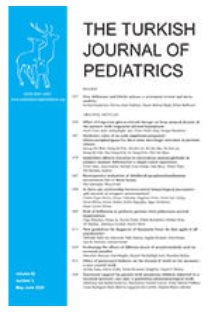Assesment of colistin related side effects in premature neonates
Assesment of colistin related side effects in premature neonates
___
- 1.Stoll BJ, Hansen N, Fanaroff AA, et al. Late-onset sepsis in very low birth weight neonates: the experience of the NICHD Neonatal Research Network. Pediatrics 2002; 110 (2 Pt 1): 285-291.
- 2.Oliveira PMN, Buonora SN, Souza CLP, et al. Surveillance of multidrug-resistant bacteria in pediatric and neonatal intensive care units in Rio de Janeiro State, Brazil. Rev Soc Bras Med Trop 2019; 52: e20190205.
- 3.Yusef D, Shalakhti T, Awad S, Algharaibeh H, Khasawneh W. Clinical characteristics and epidemiology of sepsis in the neonatal intensive care unit in the era of multi-drug resistant organisms: a retrospective review. Pediatr Neonatol 2018; 59: 35-41.
- 4.Tsai MH, Chu SM, Hsu JF, et al. Risk factors and outcomes for multidrug-resistant gram-negative bacteremia in the NICU. Pediatrics 2014; 133: e322-e329.
- 5.Grégoire N, Aranzana-Climent V, Magréault S, Marchand S, Couet W. Clinical pharmacokinetics and pharmacodynamics of colistin. Clin Pharmacokinet 2017; 56: 1441-1460.
- 6.Antachopoulos C, Iosifidis E. Colistin use in neonates and children with infections due to carbapenem-resistant bacteria. Pediatr Infect Dis J 2017; 36: 905-907.
- 7.Hoeprich PD. The polymyxins. Med Clin North Am 1970; 54: 1257-1265.
- 8.Falagas ME, Kasiakou SK. Toxicity of polymyxins: a systematic review of the evidence from old and recent studies. Crit Care 2006; 10: R27.
- 9.Suzuki T, Yamaguchi H, Ogura J, Kobayashi M, Yamada T, Iseki K. Megalin contributes to kidney accumulation and nephrotoxicity of colistin. Antimicrob Agents Chemother 2013; 57: 6319-6324.
- 10.Sahbudak Bal Z, Kamit Can F, Yazici P, et al. The evaluation of safety and efficacy of colistin use in pediatric intensive care unit: results from two reference hospitals and review of literature. J Infect Chemother 2018; 24: 370-375.
- 11.Jajoo M, Kumar V, Jain M, Kumari S, Manchanda V. Intravenous colistin administration in neonates. Pediatr Infect Dis J 2011; 30: 218-221.
- 12.Kumar PP, Giri SR, Shaikh FAR, Panigrahy N, Chirla D. Safety and efficacy of intravenous colistin in children. Indian Pediatr 2015; 52: 129-130.
- 13.Alan S, Yildiz D, Erdeve O, et al. Efficacy and safety of intravenous colistin in preterm infants with nosocomial sepsis caused by Acinetobacter baumannii. Am J Perinatol 2014; 31: 1079-1086.
- 14.Kramer MS. Determinants of low birth weight: methodological assessment and meta-analysis. Bull World Health Organ 1987; 65: 663-737.
- 15.Walsh MC, Kliegman RM. Necrotizing enterocolitis: treatment based on staging criteria. Pediatr Clin North Am 1986; 33: 179-201.
- 16.Selewski DT, Charlton JR, Jetton JG, et al. Neonatal acute kidney injury. Pediatrics 2015; 136: e463-e473.
- 17.Magiorakos AP, Srinivasan A, Carey RB, et al. Multidrug-resistant, extensively drug-resistant and pandrug-resistant bacteria: an international expert proposal for interim standard definitions for acquired resistance. Clin Microbiol Infect 2012; 18: 268-281.
- 18.Ilhan O, Bor M, Ozdemir SA, Akbay S, Ozer EA. Efficacy and safety of intravenous colistin in very low birth weight preterm infants. Paediatr Drugs 2018; 20: 475-481.
- 19.İpek MS, Aktar F, Okur N, Celik M, Ozbek E. Colistin use in critically ill neonates: a case-control study. Pediatr Neonatol 2017; 58: 490-496.
- 20.Tamma PD, Newland JG, Pannaraj PS, et al. The use of intravenous colistin among children in the United States: results from a multicenter, case series. Pediatr Infect Dis J 2013; 32: 17-22.
- 21.Temocin F, Erdinc S, Tulek N, Demirelli M, Bulut C, Ertem G. Incidence and risk factors for colistin-associated nephrotoxicity. Jpn J Infect Dis 2015; 68: 318-320.
- 22.Al-Lawama M, Aljbour H, Tanash A, Badran E. Intravenous colistin in the treatment of multidrug-resistant Acinetobacter in neonates. Ann Clin Microbiol Antimicrob 2016; 15: 8.
- 23.Cakir U, Alan S, Zeybek C, et al. Acquired Bartter-like syndrome associated with colistin use in a preterm infant. Ren Fail 2013; 35: 411-413.
- 24.Jetton JG, Askenazi DJ. Acute kidney injury in the neonate. Clin Perinatol 2014; 41: 487-502.
- ISSN: 0041-4301
- Yayın Aralığı: 6
- Başlangıç: 1958
- Yayıncı: Hacettepe Üniversitesi Çocuk Sağlığı Enstitüsü Müdürlüğü
Pınar GÜR ÇETINKAYA, Bora GÜLHAN, Ali DÜZOVA, Nesrin BEŞBAŞ, Mutlu HAYRAN, Rezan TOPALOĞLU, Fatih ÖZALTIN
A rare cause of inguinal abscess: perforated appendicitis due to foreign body in Amyand’s hernia
TUGAY TARTAR, Mehmet SARAÇ, Ünal BAKAL, MEHMET RUHİ ONUR, Ahmet KAZEZ
Local allergic rhinitis: a pediatric perspective
Burçin BEKEN, Mehtap YAZICIOĞLU, Ibon Eguiluz-GRACIA, Paloma CAMPO
Investigation of the relationship between cord clamping time and risk of hyperbilirubinemia
Yüksel YAŞARTEKİN, Serdar Ümit SARICI, Murat ÖZCAN, Melis AKPINAR, Demet ALTUN, Agah AKIN, Muhittin A. SERDAR, Dilek SARICI
Tuğba ERAT, Halil ÖZDEMİR, Aysun YAHŞİ, Tuğçe TURAL KARA, Elif ÜNAL İNCE, Kemal OSMAN MEMİKOĞLU, Erdal İNCE, Ergin ÇİFTÇİ
Response to “Neonatal form of biotin-thiamine-responsive basal ganglia disease. Clues to diagnosis”
Aydan DEĞERLİYURT, Serdar CEYLANER
SCN1A mutation spectrum in a cohort of Bulgarian patients with GEFS+ phenotype
Valentina PEYCHEVA, Nevyana IVONAVA, Kunka KAMENAROVA, Margarita PANOVA, Iliana PACHEVA, Ivan IVANOV, Maria BOJIDAROVA, Genoveva TACHEVA, Dimitar STAMATOV, Ivan LITVINENKO, Dimitrina HRISTOVA, Daniela DENEVA, Elena RODOPSKA, Elena SLAVKOVA, Iliyana ALEKSANDROVA, Emil SIMEONOV, Petia DIMOVA, Veneta BOJINOVA, Vanyo MIT
Gender-related differences in etiology of organic central precocious puberty
Alev ÖZÖN, Doğuş VURALLI, Ayfer ALİKAŞİFOĞLU, E. Nazlı GÖNÇ, Nurgün KANDEMİR, Kader K. OĞUZ
Abusive head trauma: two cases and mini-review of the current literature
Sıtkı TIPLAMAZ, Abdülvehhap BEYGİRCİ, Murat Nihat ARSLAN, Mehmet Akif İNANICI
A national survey on use of less invasive surfactant administration in Turkey
